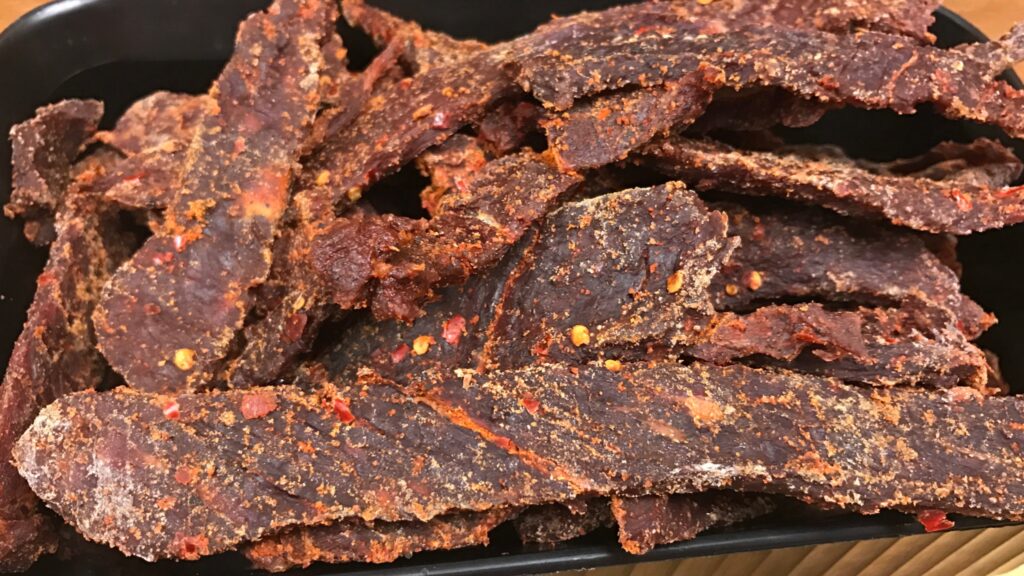
Beef jerky is a popular snack enjoyed by many people around the world. It is a form of dried and cured meat that undergoes a specific preparation process. While beef jerky is known for its delicious taste and convenience, many individuals wonder whether it is a healthy choice. In this comprehensive guide, we will explore the nutritional content of beef jerky, its potential health benefits, as well as some considerations and precautions to keep in mind.
Nutritional Content of Beef Jerky:
Beef jerky is primarily made from lean cuts of beef, which makes it a good source of high-quality protein. Protein is an essential nutrient that plays a crucial role in various bodily functions, including muscle repair, tissue growth, and enzyme production. A typical serving of beef jerky, about 1 ounce (28 grams), contains approximately 116 calories, 7 grams of fat, 3 grams of carbohydrates, and 9 grams of protein. It is worth noting that the exact nutritional composition can vary depending on the brand and flavor of the beef jerky.
Health Benefits of Beef Jerky:
- Protein Source: As mentioned earlier, beef jerky is a rich source of protein. Protein helps promote feelings of satiety, which can be beneficial for weight management. Additionally, consuming adequate protein is essential for maintaining muscle mass and preventing muscle loss, especially during periods of physical activity or aging.
- Nutrient Density: Beef jerky contains several essential nutrients, including iron, zinc, and vitamin B12. Iron is vital for the production of red blood cells and oxygen transport, while zinc plays a role in immune function and wound healing. Vitamin B12 is necessary for the formation of red blood cells and neurological health. These nutrients are particularly important for individuals following restrictive diets or those who may have limited access to certain food sources.
- Portability and Shelf Life: One of the significant advantages of beef jerky is its portability and extended shelf life. It is a convenient snack option, especially for individuals on the go or participating in outdoor activities. Beef jerky does not require refrigeration, making it a practical choice for situations where fresh food may not be readily available.
Considerations and Precautions:
- High Sodium Content: One of the main concerns with beef jerky is its high sodium content. The curing and drying process typically involves the use of salt, which contributes to the characteristic taste and preservation of the meat. Excessive sodium intake can lead to health issues such as high blood pressure, water retention, and an increased risk of cardiovascular disease. Individuals with hypertension or other medical conditions that require sodium restriction should be mindful of their beef jerky consumption.
- Processed Meat and Additives: Some commercial beef jerky brands may contain additives, preservatives, and flavor enhancers. These additives can include nitrites, nitrates, monosodium glutamate (MSG), and various artificial ingredients. While the impact of these additives on health is still a topic of debate, it is generally recommended to choose minimally processed or homemade beef jerky to avoid potential adverse effects.
- Caloric Intake: Despite being high in protein, beef jerky can be calorie-dense due to its fat content. It is essential to consume it in moderation and be mindful of portion sizes, especially if you are watching your calorie intake or trying to manage your weight. Additionally, individuals with specific dietary needs or goals, such as those following a low-fat diet, may need to consider alternative snack options.
- Food Safety: Proper food safety practices are crucial when consuming beef jerky. It is important to ensure that the jerky is properly stored, as it can be susceptible to bacterial growth if not handled correctly. Follow the manufacturer’s instructions regarding storage, and if you are making homemade beef jerky, ensure that it is adequately dried, cooled, and stored in an airtight container to prevent spoilage.
Conclusion:
In conclusion, beef jerky can be a convenient and flavorful snack that provides a good source of protein and essential nutrients. Its long shelf life and portability make it a popular choice for individuals with busy lifestyles or those engaging in outdoor activities. However, it is important to be mindful of the high sodium content, potential additives, and caloric intake associated with some commercial beef jerky brands. As with any food, moderation and choosing quality options are key. If you have specific dietary restrictions or health concerns, it is always advisable to consult with a healthcare professional or registered dietitian.
- What are DELTA 9 + HHC + DELTA 10 GUMMIES - July 18, 2023
- Is Beef Jerky Good for You? - July 10, 2023



